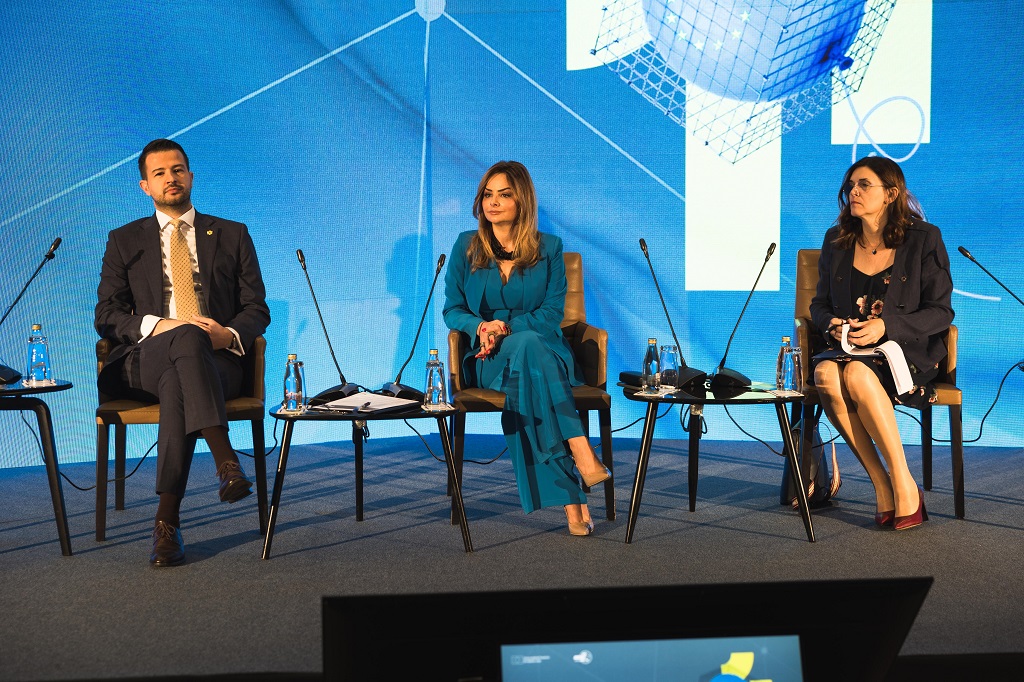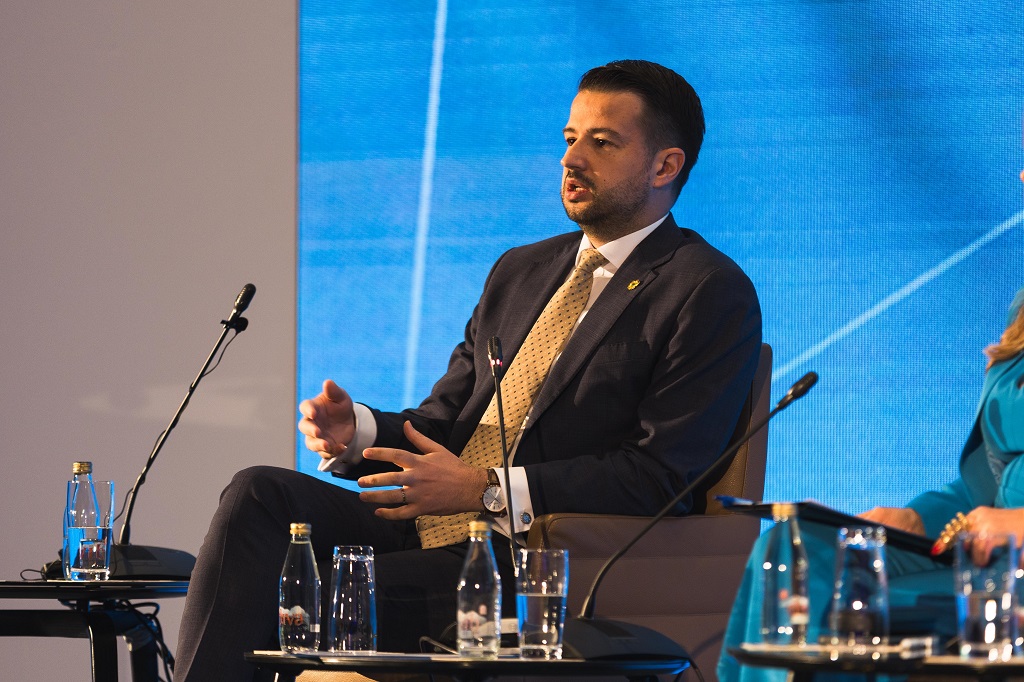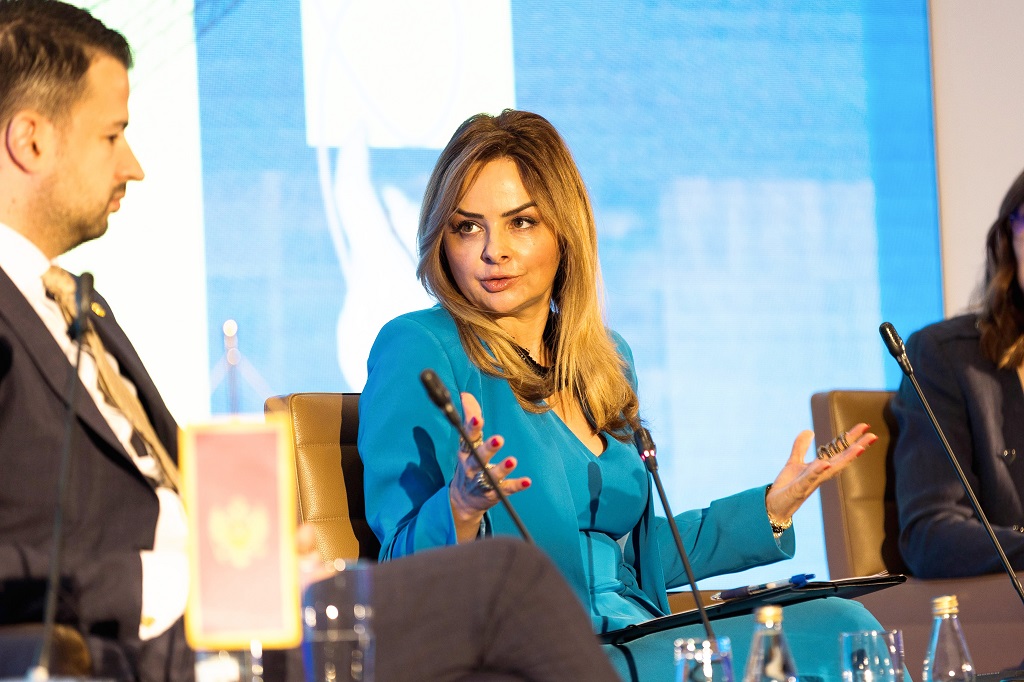In the next three years, Montenegro needs to find strength to complete political processes and consolidate itself in order to complete the process of European integration by the end of 2027, stated the President of the country, Jakov Milatović, at the conference “Review of 11 years of progress and challenges – how to revive Montenegro’s accession negotiations with the EU” organized by the Centre for Civic Education (CCE) together with partners and the support of the European Union.
Milatović said that Montenegro’s European path can be divided into three periods – from 2012, when the official negotiations with the EU began until the formation of Duško Marković‘s Government; then from 2016 to 2020, and from 2020 to present time. He also emphasized that the accession process should be observed in terms of political will and technical capacity.
“In the first period, progress was recorded, especially in technical terms. A considerable number of chapters were opened, and there was impetus in our European path. It seems to me that a slowdown occurred from 2016 to 2020 due to a lack of political will to unblock many important issues, primarily related to judicial reform,” stated Milatović.
He assessed that the neglected problems came to the surface only after 2020. “The third period is characterized by the existence of political will to get things done and to approach to major problems-solving in our judiciary. However, it should be noted that the institutional instability that existed slowed down the technical aspect of improving our European path,” Milatović said.
He considers that that lessons should be learned from those three periods and that the groundwork should be prepared for the final part of the European path. “This refers to the period of the next three years which will be crucial for Montenegro to truly become a full EU member, somewhere around 2027 or 2028,” Milatović stated.
Commenting on the European Commission’s non-paper on rule of law in Montenegro, Milatović stated that Montenegro has done the most in the past three years regarding its European path. “We should pose the question – could we have been simultaneously dedicated to the European path and the significant social and political changes that were taking place,” said Milatović, explaining that in the past three years, Montenegro focused on the main and crucial precondition for accelerating its European path – the first democratic change of government that was necessary to unlock the judiciary.
“I hope that in the coming three years, we will find the strength to complete the political processes, consolidate ourselves, and on that background, start the technical part of completing the story, in order to finalize the European path by the end of 2027,” said Milatović.
“It is important that appointments in the judiciary, which are within the competence of the Parliament, happen in the next few months. The new convocation will most likely be verified in the second half of July, and as the President, I expect them to act responsibly and find a consensus regarding the selection of five important appointments in the judiciary,” Milatović emphasized, expressing the expectation that a positive step by the EU will follow.
“This will enable us to start closing part of the remaining chapters by the end of the year, giving impetus to our EU path,” Milatović concluded.
“Montenegro urgently needs a government that will implement reforms. The country has already lost too much time – because of your politicians, and to some extent, because of the EU,” assessed Manuel Sarrazin, Special Envoy of Germany for the Western Balkans, who addressed the participants via video message, emphasizing that this is the moment to ensure that Montenegro’s path is irreversibly directed towards the EU.
He also stated that Montenegro has 11 years of experience working with the EU, getting acquainted with European acquis, and having a clear to be done list.
“I believe that this is the perfect moment, after the Parliamentary elections, for all of you to get together and try to find a manner to work together with all pro-European forces, both in politics and civil society, in order to accelerate your path,” said Sarrazin.
He stated that the European Union urgently needs new genuine leaders and added that they are waiting for positive news from the Western Balkans.
As Sarrazin emphasized, this is the moment to demonstrate that the new Government will be formed quickly and efficiently, and that the institutions in the country will start functioning promptly and reliably, especially in the areas of the rule of law and the functioning of the judiciary.
“And then, try to build a road ahead, to swiftly implement reforms in close cooperation with the European Commission, integrating everyone, especially civil society, and even those political parties that may not be part of the government but wish to make a positive contribution on this path,” Sarrazin added.
The Head of the EU Delegation to Montenegro, Oana Cristina Popa, underlined that Montenegro has strong political support from EU member states as well as European institutions.
“The authorities in Montenegro have consistently spoken about this country’s dedication to European integration. Much progress has been made, but valuable time has also been lost. It seems that in recent years, the focus on European reforms, especially in the area of the rule of law, has been lost, with a number of obstacles that have not yet been fully addressed,” stated Popa.
She emphasized the need for a strong commitment to reforms. “A stable Government has to be formed as soon as possible, with EU-related reforms as its top strategic priority. We heard encouraging signals and clear messages from most of the political protagonists after the elections, and from President Milatovic. But concrete action will have to follow,” said Popa.
She also stated that all political actors and institutions must work constructively.
Popa reminded that the rule of law is the key, adding that a Member State of the EU must be able to deal with domestic corruption and organized crime, guaranteeing full media freedom, and having in place an efficient, competent, and independent judiciary. She pointed out that Montenegro needs progress in chapters related to the rule of law, emphasizing that no additional chapters can be provisionally closed before the interim benchmarks set in the rule-of-law area are met.
“The non-paper on Chapters 23 and 24, which the Commission recently drafted, provides a clear assessment in this area and sets out the way forward,” highlighted Popa.
She stressed that the Parliament should become the place of a functioning democratic dialogue. “It is important that the new Parliament convenes without delay, and that it resumes its regular and constructive work, building a consensus among all political forces. Political dialogue must lead to effective decision-making,” stated Popa.
Popa emphasized that EU will continue supporting Montenegro’s economic and social development by providing financial assistance and boosting trade and investments, notably through Economic and Investment Plan. “Unfortunately, for the moment, Montenegro is lagging when it comes to preparing and implementing mature and strategic EU-funded projects,” said Popa, emphasizing that national administrative structures need to be strengthened to better prepare these programmes.
“Montenegro’s negotiations with the European Union, 11 years later, coincide with a pivotal moment in the country’s EU accession process. Let us move forward with renewed vigour and a shared vision of a European future for Montenegro, united in our commitment to the values that define the EU. Hopefully, when we meet in one year to mark the twelfth anniversary, we will all have some great news to share,” concluded Popa.
The Executive Director of the CCE, Daliborka Uljarević, stated that 11 years after the opening of accession negotiations, Montenegro has been counting years without a Supreme State Prosecutor and a President of the Supreme Court in a full term, as well as without full composition of the Judicial Council and the Constitutional Court.
“Montenegro also lacks a functional negotiation structure, and it seems that the anniversary since Parliament passed a vote of no-confidence in the Government is approaching, even though that Government continues to function, ignoring the legitimacy deficit and making irresponsible decisions with serious and far-reaching consequences,” said Uljarević.
According to her, the Parliament missed the opportunity to be a place of dialogue and compromise on issues of public importance, while MPs, with full awareness and questionable conscience, adopted unconstitutional laws.
“It will be remembered that the candidate for the Judicial Council, who was a judge of the European Court of Human Rights (ECHR), whose jurisdiction extends to 800 million people, was not good enough for the MPs. Of course, it is not about the high criteria of the MPs who voted that way, but precisely about trampling on all criteria,” Uljarević stated.
Consequently, as Uljarević assessed, the professionalization of public administration remained a dead letter, and there is the ongoing championship between political parties in party employment and the unsustainable increase in wages in the public sector, where all ruling parties have demonstrated enviable form and skill.
“On a positive note, Montenegro has gained experience in political change, but the new majority firmly remains on the worst practices of its predecessors, with the dangerous additional element of jeopardy of the civic and anti-fascist essence of the state of Montenegro,” she said.
Uljarević warned that the hard-won rights are being questioned again, and attempts are being made to normalize the targeting of LGBT people, women, and to grade the suffering of victims of war crimes by classifying them on an ethnic basis.
“Instead of efforts to calm tensions, deep polarization has continued, to which the government’s subservience to one religious community – the Serbian Orthodox Church – at the expense of the interests of the entire society significantly contributes,” Uljarević said.
She stated that Montenegro set the coordinates of its European path with its independence. “Unfortunately, we still lack skilled helmsmen who would lead all passengers, the citizens of Montenegro, to a safe destination. And while the passengers, i.e., the citizenry, strongly support the path to the EU, these helmsmen increasingly choose detours, prioritizing their own interests over the public interest, thus distancing us from European harbours, as well as from certainty, security, and prosperity,” Uljarević believes.
She said that although there is strong support for the EU, it is not surprising, but it should be worrying that a fifth of citizens believe that Montenegro will never enter the EU. “These are the ones who, if we continue to allow particular interests to crash us against the rocks, may turn to euroscepticism. And already today we should be thinking about how to prevent that, how to maintain the belief that this dream is not unattainable, that we can achieve it through joint efforts, even though our decision-makers are doing everything to distance us from it,” considers Uljarević.
She reminded that the EU is open to Montenegro, but it is not open to compromising on the values and standards on which it is based. She concluded that the absence of reasoned and sincere dialogue, the gap between social and political actors, and the strong influence of undemocratic external actors remain key characteristics of the scene in Montenegro, as well as that it is necessary to lead a broad dialogue on what kind of state of Montenegro we need.
The conference, which was attended by around 200 participants from various sectors, is held within the project „CSOs in Montenegro – from basic services to policy shaping – M’BASE” is implemented by the CCE, in partnership with the Friedrich Ebert Stiftung (FES), NGO Center for the Protection and Research of Birds (CZIP) and NGO Politikon Network, in cooperation with the Ministry of Public Administration and Ministry of European Affairs. The project is financed by the European Union and co-financed by the Ministry of Public Administration.
MINA Agency/CCE





